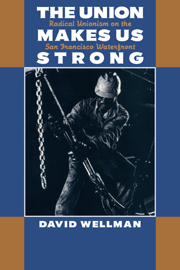Book contents
- Frontmatter
- Contents
- Preface
- Notes on unpublished sources
- PART I LABOR RADICALISM REVISITED
- PART II LOCAL COMMUNITY AND “TUMULTUOUS” DEMOCRACY: THE SOCIOCULTURAL FOUNDATIONS OF UNIONISM ON THE SAN FRANCISCO WATERFRONT
- PART III UNIONISM, WORK, AND TECHNOLOGICAL CHANGE
- PART IV WAGING THE BATTLE FOR WORKPLACE CONTROL ON CONTRACTUAL TERRAIN
- PART V AGREEING TO DISAGREE: BEING DEFENSIBLY DISOBEDIENT
- Conclusion: Trade union exceptionalism or prefigurative politics?
- Appendix: Doing field research: An ethnographic account
- References
- Name index
- Subject index
PART II - LOCAL COMMUNITY AND “TUMULTUOUS” DEMOCRACY: THE SOCIOCULTURAL FOUNDATIONS OF UNIONISM ON THE SAN FRANCISCO WATERFRONT
Published online by Cambridge University Press: 11 November 2009
- Frontmatter
- Contents
- Preface
- Notes on unpublished sources
- PART I LABOR RADICALISM REVISITED
- PART II LOCAL COMMUNITY AND “TUMULTUOUS” DEMOCRACY: THE SOCIOCULTURAL FOUNDATIONS OF UNIONISM ON THE SAN FRANCISCO WATERFRONT
- PART III UNIONISM, WORK, AND TECHNOLOGICAL CHANGE
- PART IV WAGING THE BATTLE FOR WORKPLACE CONTROL ON CONTRACTUAL TERRAIN
- PART V AGREEING TO DISAGREE: BEING DEFENSIBLY DISOBEDIENT
- Conclusion: Trade union exceptionalism or prefigurative politics?
- Appendix: Doing field research: An ethnographic account
- References
- Name index
- Subject index
Summary
WHAT happened to that something special that captured the imagination of industrial workers in the 1930s? Why was the festive upheaval, the celebration of self-governance in everyday life so shortlived? What happened to the democratic cultures of solidarity and resistance?
Organized pluralism and democratic political culture were undermined, some historians answer (Lichtenstein, 1984; Moody, 1988), in the late 1940s and early 1950s when the CIO formalized its relationship with capital. The new relationship between management and labor reduced rank-and-file participation in union affairs. Bureaucracy replaced democracy as an organizational principle in the CIO.
Two reasons are given for this development. One is that nationally negotiated contracts led directly to the rise of bureaucratic power. The contractual relationship required labor to commit itself to procedural rule, predictability, and order. Therefore, as the relationship matured, union power was transferred from the shopfloor to international headquarters. Since national contracts required national organizations to negotiate and enforce them, local unions had less power to control their internal affairs. The national contracts also centralized negotiable items, and issues that were once delegated to locals, like production standards, became the responsibility of national officers, leaving less for locals to bargain. As a result, power was increasingly centralized.
But bureaucracy did not result solely or inevitably from the CIO's contractual relationship with capital. It was also a political accomplishment. Recalcitrant shopfloor militants and oppositional politics had to be defeated; organized political pluralism had to be either destroyed or strictly limited. It was destroyed, a number of historians argue, in large part by an anticommunist crusade that began in the 1940s.
- Type
- Chapter
- Information
- The Union Makes Us StrongRadical Unionism on the San Francisco Waterfront, pp. 49 - 56Publisher: Cambridge University PressPrint publication year: 1995



